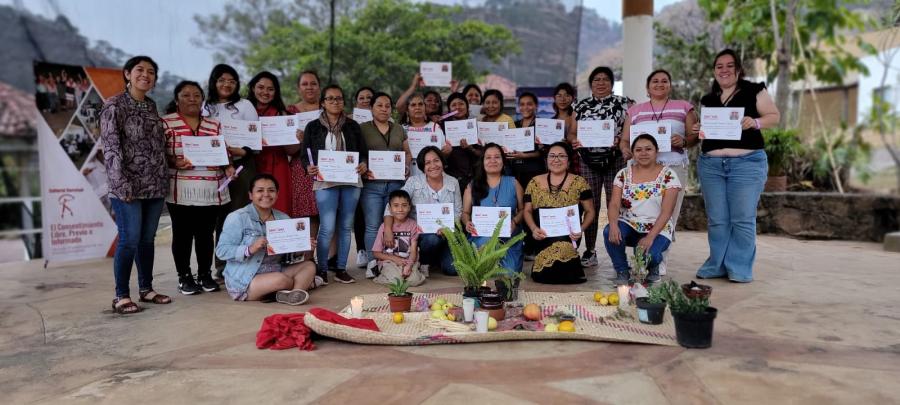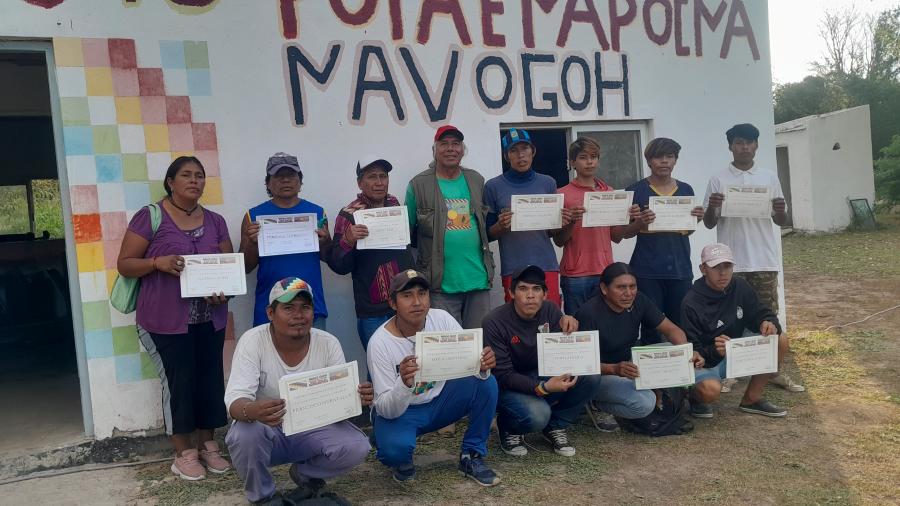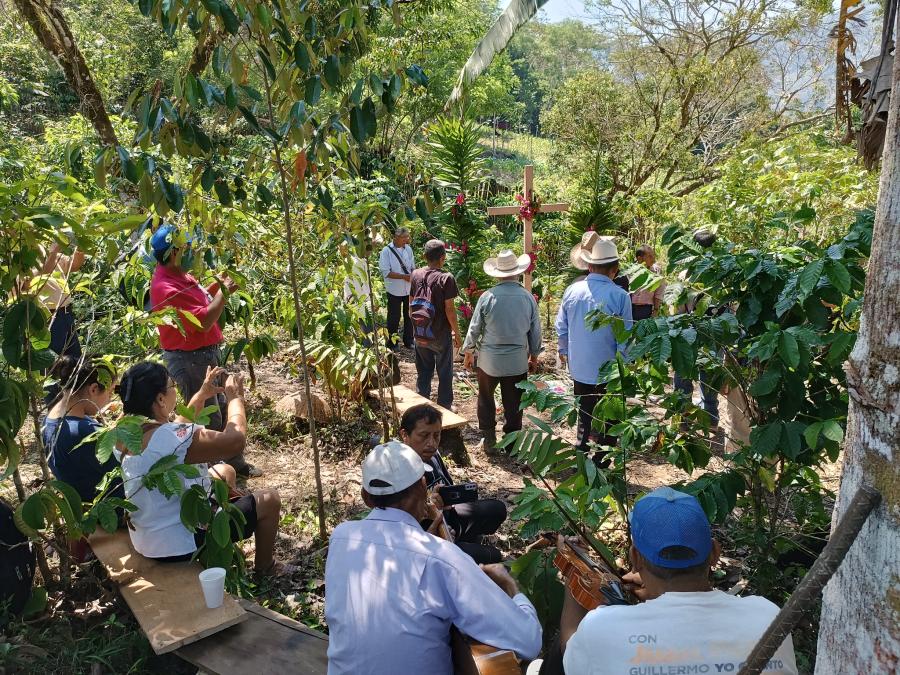The armed conflict that broke out in Chiapas on the first of January has brought up many questions about the general picture of the Indigenous population. Different historical experiences have defined the way in which Indigenous people displaced from the highlands, as well as immigrants, view their identity and how, through armed struggle, they take a stance politically opposed to the Mexican government.
In order to make a more incisive analysis, many anthropogists have pointed out that it is necessary to examine both differences in class and political views within communities, as well as the differences in regions. However, as is the case in the majority of anthropological studies carried out in the region of Chiapas (except for a noteworthy few), gender differences have been absent from speculative analyses.
The Mexican Academy still refuses to recognize differences in gender as a fundamental part of understanding and explaining social relationships. Ethnographies and anthropological analyses continue to rely on information given to them by "informers," - men who act as representatives of the Tzeltal, Tzotzil or Tojolabal cultures. Meanwhile, Indigenous women from many different areas call attention to the fact that it is important to recognize their specific problems and experiences. Their voices have not been absent from the political debate going on within the current conflict.
On the first of January, the National Liberation Zapatista Army (Ejército Zapatista de Liberación - or EZLN) began to distribute pamphlets called The Mexican Awakening (el despertador mexicano). It was startling to find that among its revolutionary laws there was a Revolutionary Law for Women. For these who have been denying the Indigenous foundation of this movement, the claim to reproductive rights for women and for their greater participation in the community is yet more proof that "outside" forces are an underlying part of this movement.
For those who continue to view Chiapaneco Indigenous people as descendants of the Maya who live in incorporated, closed communities and who are organized around a barter system, it would be difficult to imagine that Indigenous women could demand the right to participate in politics or to marry the partner of their choice.
Indigenous men and women have reinvented their group identities within a framework of accelerated procedures of political and economic change; they have left their communities to colonize the jungle; they have emigrated to areas of the oil industry, to San Cristóbal and to Tuxtla, and some of them have even gone to the United States. Indigenous women have been involved in organizing procedures such as cooperatives, health projects, savings banks, and they have often had to negotiate directly with both state and national authorities in order to demand their rights. More than rejecting their "traditional" practices, many of these Indigenous women have insisted on reinventing it under new terms and within this transformation process.
If we are to take into consideration that a large part of the social base of the EZLN is made up of colonists from the Lacandon and by displaced people from the Altos region, we can see that it is these new social issues that have redefined their ethnic identity. The very same Indigenous women who were at the head of the "First Uprising" in March of 1993, are the ones being referred to in a Zapatista communiqué (La Jornada, January 30) which describes how these women traveled throughout communities in the forest talking to other women "in order to extract and formulate from their thoughts a Law Women." Zapatista women demand for the right to participate in the revolutionary struggle to the extent that their will and capacity allows them; to work and receive fair wages; to decide on the number of children they can have and take care of; to have posts of responsibility and to be allowed to participate in the running of the community; to the right to health and education; to the right to marry the partner of their choice and to not be forced into an arranged marriage; to not be the victims of any kind of violence, and finally, to the right to positions of leadership within the revolutionary forces (The Mexican Awakening, 1, December 1993.)
Indigenous women have looked for a place to be heard in other political realms as well. Within the framework of the current conflict, 288 peasant organizations have met in San Cristóbal de Las Casas from January 22-24 and February 15-16 in order to present their position on the problems going on in the region and on the armed uprising. The Independent Organization for Indigenous Women, the San Cristóbal Craftswomen Organization, craftswomen from J'pas Joloviletik, and various Social Security Societies (SSS) for female campesinos are some of the women's organizations that participated in the Chiapas Conference for Campesinos and Indigenous people.
Even though men presided over the work tables and dominated most of the discussion, Indigenous women were able to get some of their specific needs addressed in the debates. They requested that campesinos women be able to count on a plot of land and that credit be available to them so they might carry out their own production projects; that there be an increase in the amount of participation from women and that social, cultural and productive organizations be established; that the government give pensions to all war widows from both sides as well as to widows of civilians that are killed during the struggle; and finally, that a Women's Commission to address specific problems and needs be included in the internal framework of the State Council for Campesino and Indigenous Organizations of Chiapas (CEOIC-a council that was established at the first meeting).
For those who continue to view Chiapaneco Indigenous people as descendants
of the Maya who live in incorporated, closed communities and who are
organized around a barter system, it would be difficult to imagine that
Indigenous women could demand the right to participate in politics or to
marry the partner of their choice.
Women have also played an active role in the takeover of municipal leaderships. The Chiapaneco population has constantly denounced the authoritarianism and corruption of the Priista municipal leaders. The people of Teopisca, tired of the state government's apathy to reports of corruption by a municipal official, Héctor Alvarez Gordillo, decided to use more radical methods of pressure. On February 8, they temporarily captured and tied up two federal delegates until the governor agreed to remove Alvarez Gordillo from his post. The women from Teopisca, who have already been organized for a number of years in production cooperatives, were at the head of this action. Four of them were in charge of tying up the federal delegates Francisco Zepeda Bermúdez and Trinidad Palacios, while Carlos Padilla Lara coordinator of the state procurator, negotiated with the governor over the telephone for the dismissal of the corrupt official.
Another area in which Indigenous women have participated is in the Peace with Social Justice marches which have been organized in the various municipalities that have been affected by the conflict. More than a hundred Tzotzil and Tzeltal craftswomen from different villages in the Altos region took part in the Women for Peace march that took place in San Cristóbal last January . During this march, one of the Tzotzil women spoke up to denounce the situation of extreme poverty that their communities live in.
These women traveled throughout communities in the forest talking to other
women "in order to extract and formulate from their thoughts a Law for
Women."
Others translated into Tzotzil and Tzeltal a document written by the Women for Peace Network about the condition of Indigenous women in areas of conflict. The craftswomen pointed out that many of them have lost their husbands in the armed conflict and that the maintenance of their families is now totally up to them. Some of them have started to go to coffee plantations to look for work.
The agriculture crisis, migration, and now the war have unstructured and restructured Indigenous communities; it is therefore not surprising that the dissolution and creation of new social spaces are causing group identities to be redefìned under new parameters. Indigenous women play an active role in the formation of this new sense of identity. If, like anthropologists, we continue to ignore what is specifically different about these procedures, then our analyses will continue to leave out half the population.
Focusing on gender does not mean adding a special section on women and families to ethnographies, rather it means performing an analysis to determine how social relationships between men and women and the existing inequalities between the two affect each and every part of daily life in both the public and private realms.
In order to completely understand all of the complex procedures that Chiapas is currently undergoing, it is of utmost importance that one be aware of the differences and specific aspects in which the diverse sectors of the Indigenous population have integrated themselves to the political struggle.
Article copyright Cultural Survival, Inc.



